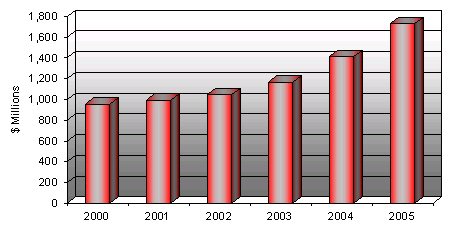VDC study predicts slow, steady growth of VOIP market
Jan 28, 2002 — by LinuxDevices Staff — from the LinuxDevices Archive — viewsNatick, MA — (press release excerpt) — Recent analysis by Venture Development Corporation (VDC) confirms what telecommunications pundits have prophesized for years — network convergence is upon us. However, the research also suggests that the transition to packet telephony will be a lengthy and perpetual one. Unlike many overly fervent projections insisting that the market for Voice over Packet products would explode 10 or 20 fold from its current size in the next few years, VDC's latest report, The Global Market for Signaling Products and Related Equipment in PSTN and Voice over Packet Networks predicts a steady 12.6% average annual growth rate through 2005, putting the global market at just over $1.7 billion by then.
VDC's healthy but comparatively modest forecast is based on several factors the company feels will keep the global expansion of packet-based networks measured until the middle of the decade. The sheer excess of circuit-switched legacy equipment currently in place dictates that replacing it will be quite prolonged. The telecom industry as a whole, particularly in North America and Europe, has been mired in a slump that started in mid-2000 and will continue straight through the first half of 2002. These business conditions have curtailed the amount of progress possible during the downswing.
Still, VoP is gaining traction in the marketplace due to its low cost, efficient, and flexible nature. With multiple efforts being made to address quality and security, the two most pressing issues for the technology, it is beginning to gain further acceptance. As the telecom industry commences its rebound from its decline in 2002, and large service providers complete depreciation of their legacy investments, more and more bundled offerings should emerge on the market, many coupling voice and data capabilities. As the chart below displays, growth of VoP products over the five-year forecast period is strongly skewed towards the later years.

From this, converged technology is expected to sprout a myriad of enhanced services. With the ability to access multiple data repositories from multiple devices, packet-based communications presents endless possible applications. Regardless of the device being used, (mobile phone, wireline phone, PC, PDA, etc.) information from personal or enterprise databases, intranets, or the worldwide web could be accessed and processed. Add to this the enabling characteristics of currently developing speech-to-text and text-to-speech technology, and it is clear that the management and delivery of information will never be the same again. The inherent low cost of packet telephony coupled with the ability of users to provision and control their own specific service packages via the Internet will make this technology endearing to the masses. The ramifications of these streamlined methods of communications will be dramatic in all sectors of the business world. The changes will come slowly, but their impact will be felt immediately.
The Global Market for Signaling Products and Related Equipment in PSTN and Voice over Packet Networks report is a recent VDC study and is designed to provide subscribers with relevant up-to-date market intelligence to support product planning, market development, and channel partnering decisions. These new reports discuss the issues and challenges surrounding the inevitable transition of telephony to a packet-based architecture, as technology and innovation over the recent past have enabled. They provide in-depth analysis of the market for packet-based equipment, and contain strategies for surviving and succeeding in this progressive marketplace. Volumes I and II together provide a comprehensive, holistic view of the pertinent issues and trends in the telecommunications industry today.
This article was originally published on LinuxDevices.com and has been donated to the open source community by QuinStreet Inc. Please visit LinuxToday.com for up-to-date news and articles about Linux and open source.